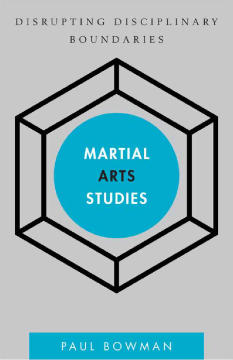
Additional Information
Book Details
Abstract
The phrase “martial arts studies” is increasingly circulating as a term to describe a new field of interest. But many academic fields including history, philosophy, anthropology, and Area studies already engage with martial arts in their own particular way. Therefore, is there really such a thing as a unique field of martial arts studies?
Martial Arts Studies is the first book to engage directly with these questions. It assesses the multiplicity and heterogeneity of possible approaches to martial arts studies, exploring orientations and limitations of existing approaches. It makes a case for constructing the field of martial arts studies in terms of key coordinates from post-structuralism, cultural studies, media studies, and post-colonialism.
By using these anti-disciplinary approaches to disrupt the approaches of other disciplines, Martial Arts Studies proposes a field that both emerges out of and differs from its many disciplinary locations.
Occasionally, a book is published that makes the ‘expert’ reviewer wish that he or she might have had the chance to read it before ever publishing anything on the topic at hand. Martial Arts Studies is just such a book ... Paul Bowman has done a wonderful job of both delightfully entangling us in the object of study and disrupting perhaps too comfortable relationships with the boundaries of our respective disciplines.
What happens when a first rate scholar and long-time martial arts practitioner turns his attention to an orphan discipline? First, the field can never be considered marginal again; second, the founding fathers of martial arts studies will be challenged to step up their game to the next level; and finally, readers will get a crash course in the language and concepts of post-modern scholarship, allowing them to follow the ongoing debates in martial arts studies, where landing one good accusation of Orientalism, sexism or essentialism is like a flying roundhouse kick to the head. For those who seek a deeper knowledge of the role of martial arts in contemporary culture, and hence a deeper self-knowledge, they will find no better inspiration than Paul Bowman's Martial Arts Studies.
Douglas Wile, Author of Lost T'ai-chi Classics from the Late Ch'ing Dynasty and T'ai Chi's Ancestors.
Paul Bowman is director of postgraduate research studies in the School of Journalism, Media and Cultural Studies at Cardiff University. He is the founding editor of JOMEC Journal; founder of the Centre for Interdisciplinary Film and Visual Culture Research; director of the Race, Representation and Cultural Politics Research Group and co-director of the Reconstructing Multiculturalism Research Network.
He has edited multiple issues of the journal Parallax, plus issues of the journals Postcolonial Studies, Social Semiotics and Educational Philosophy and Theory, as well as regular issues of JOMEC Journal. In addition, he has edited several books: Interrogating Cultural Studies (2003), The Truth of Žižek (2006), The Rey Chow Reader (2010), Reading Rancière (2011) and Rancière and Film (2013). He has also authored many academic monographs: Post-Marxism versus Cultural Studies (2007), Deconstructing Popular Culture (2008), Theorizing Bruce Lee (2010), Culture and the Media (2012), Beyond Bruce Lee (2013) and Reading Rey Chow (2013). His work has been translated into Italian, Spanish, Chinese and Farsi. He is on the editorial board of Culture Machine, Global Discourse, East Asian Journal of Popular Culture, The Poster, and Ctrl-Z: New/Media/Philosophy.
Following Nietzsche, Paul Bowman likes philosophising ‘with the hammer’. I think what he wields as a writer is more like a magic wand. Whisking received ideas of discipline, institution, tradition, body, nation, narration, media, theory and reality out of their usual academic slots, Bowman sends them spinning into the air to meet dreams, a visionary politics of culture and deep learning in martial arts. The result is intoxicating, a rush of energy from page to page. In Martial Arts Studies, impossible combinations take sparkling new shape and thinking is free to begin again.
Meaghan Morris, Professor of Gender and Cultural Studies, University of Sydney
